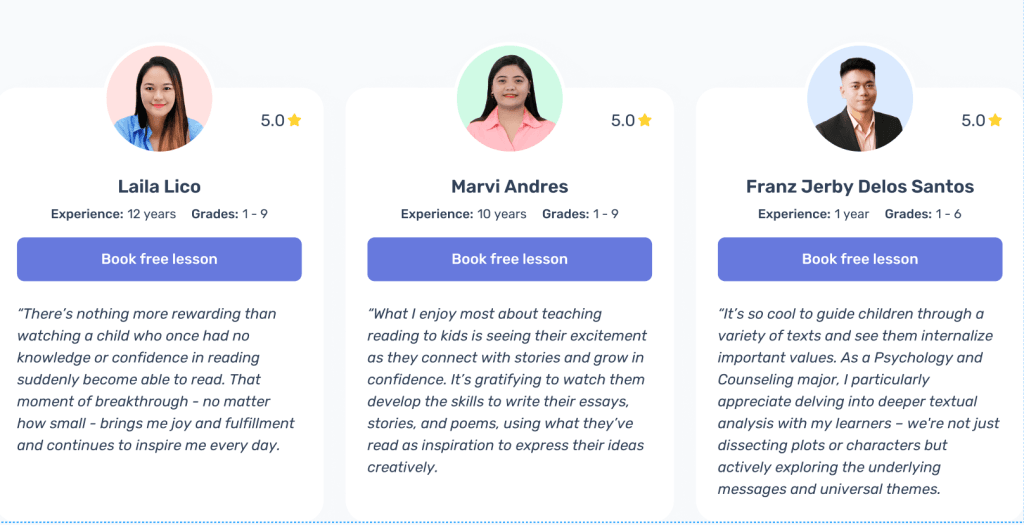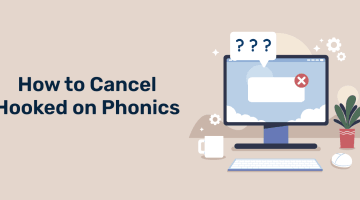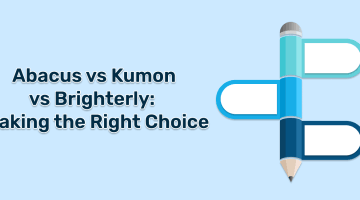Benefits of Reading Aloud & How to Make It a Habit for Your Kid
reviewed by Franz Jerby Delos Santos
Updated on November 14, 2025
Have you ever wondered why experts emphasize reading aloud to kids so often? The benefits of reading aloud go far beyond helping children recognize words. In this article, I will look into some of the benefits of reading aloud and how reading aloud can make a big difference in your child’s literacy skills.
Key points
- There are many benefits of reading aloud, including improving pronunciation and focus, strengthening memory, and helping kids understand what they read more deeply.
- This simple habit can spark your child’s curiosity, grow their love of reading, and offer a shared pastime you both enjoy.
- Kids can become better at reading aloud with a bit of practice, and parents can help them through a few simple strategies, like choosing short, engaging texts, slowing down, recording the reading sessions, and reviewing them.
What are the reading out loud benefits?
- Makes pronunciation and articulation better
- Builds vocabulary
- Improves memory
- Facilitates faster and more thoughtful comprehension
- Develops active listening skills
- Sharpens focus and concentration
- Turns kids into better public speakers
- Establishes social and emotional bonds
Makes pronunciation and articulation better
So, what are the benefits of reading aloud? Due to the Journal of English Studies, this first benefit on my list has been shown to do wonders for pronunciation. In fact, it’s like giving your child’s speech muscles a fun little workout. When your child reads out loud, they see the words, pronounce them, and hear how they sound. Talk about killing several birds with one stone! This mix of seeing, speaking, and listening will help them pay attention and notice the difference between how a word should sound and how they actually say it.
Think of it as practice for both the tongue and the ear. Kids learn to slow down, pronounce each word clearly, and get used to the rhythm and sound of the language. Over time, your kid will become a much better reader, and you’ll start to notice fewer mumbled endings, skipped syllables, and misplaced emphases.
You can do it at home or address professional teachers. For example, with the Brighterly reading program, your kid will get plenty of guided reading aloud practice that will help them to pronounce the words clearly and read much more fluently.
How Brighterly reading lessons help improve pronunciation & articulation
During the one-on-one sessions, your kid will be working with friendly, experienced, and dedicated reading tutors who will help turn reading aloud into an exciting experience and understand why is it better to read out loud. Tutors guide the student as they read the stories, model correct and clear pronunciation, and help them pick up the right sounds, rhythm, and tone. Because the lessons are interactive, reading feels more like fun conversations, during which your child can explore new vocabulary and receive instant feedback in a supportive way. Tutors also use materials like grade-specific reading worksheets and reading tests depending on your kids’ interests and learning goals.
Builds vocabulary
One of the advantages of reading aloud is that it’s one of the easiest ways to expand your child’s vocabulary in a way that doesn’t feel like “studying.” When they read aloud and listen to stories, they come across phrases and words they might not hear in daily conversation. This way, your kid learns the vocabulary in context instead of just memorizing the words, and learns how to use them naturally. Over time, they will build a rich and colorful vocabulary, which will improve their reading comprehension, speaking, and even writing skills later on.
The benefits of reading out loud apply not only when your kid is reading the texts, but also when you read the stories and books. The Journal of Developmental & Behavioral Pediatrics research shows that kids, whose parents read them between one and five picture books aloud daily, are exposed to 1.4 million more words by the time they are 5 than the kids who are not read aloud to. This shows just how important reading aloud is to building vocabulary.
Improves memory
Another wonderful benefit of reading aloud is how it strengthens your child’s memory. When your kid listens to a story, follows the plot, and tries to guess what happens next based on what they read earlier, they’re actually giving their working memory a workout. They need to recall characters, settings, and events, all while connecting what they already know with what they’re hearing at that moment. This will also help them to improve focus and attention, important skills for later academic life.
Reading aloud also activates both auditory and visual memory. As your child hears the words and sees the pictures or text, their brain builds stronger associations between sounds, meanings, and images. This is known as the “Production Effect”, when the words (and longer texts) are remembered better if they are spoken aloud.
The reason I find this advantage of reading aloud particularly great is that it’s not reserved for children only. Reading aloud also improves the memory of adults, so as you engage in a family reading session with your kid, you will not only be helping them, but also training your own brain.
Facilitates faster and more thoughtful comprehension
One of the more common questions about reading out loud benefits is “Does reading out loud help comprehension or not?”. The answer is, it absolutely does! Reading out loud helps make sense of complex or detailed texts. We’ve all been there, when you read but your mind is drifting elsewhere, or we skim through a difficult sentence without fully understanding what it says. This happens for kids as well, and the main benefit of reading aloud in this case is that it slows the reader down. They start to pay attention to every word or pause, which gives the students time to absorb the meanings of passages they have just read and how the ideas connect together.

This is especially useful in case of more challenging texts, like a story with new words or a history passage. Reading aloud helps students see how sentences are built and break them into smaller parts. This makes it easier to follow the logic and “see” what’s happening in the text, which also improves their critical thinking and literary analysis skills.
Develops active listening skills
The benefit of reading aloud I want to discuss next is that it helps improve active listening skills, which make a big difference both in school and in everyday life. When kids read aloud, they not only speak, but also listen to themselves. This way, they learn to pay attention to both the meaning and the sound of what they are reading, as well as how the sentences flow.
As they read, your kid will start noticing when something doesn’t sound right and will learn to self-correct. It’s almost like having two roles at the same time, as the reader and the listener, and the focus your kid needs to balance these two roles will help them stay present and fully engaged with the text.
Over the long term, as the brain becomes better at connecting sounds, words, and meanings, your kid will also become better at remembering details from what they hear.
So, when your kid is reading aloud a story at bedtime or participating in a classroom read-aloud, each page helps them build the habits of attentive and thoughtful reading.
Sharpens focus and concentration
I mention this particular advantage of reading aloud passingly earlier in the text, but I do think it deserves to be looked into in more detail.
Reading aloud is a “single-tasking” activity. Can you imagine reading aloud and thinking of something else at the same time? It’s nearly impossible! Your kid needs to keep a sharp focus on the text, and their mind cannot wander off; otherwise, they won’t be able to read. This naturally reflects positively on focus and concentration. They need to stay present to pronounce each word, follow the story, and keep the tone steady. This kind of full attention helps your child stay engaged with what they’re reading and understand it more deeply.
This ability to stay focused on one task for longer periods is a skill that cannot be overrated and will help them achieve success in other classes as well.
Turns kids into better public speakers
Another one in my list of benefits of read aloud, and often an overlooked one too, is the fact that reading aloud can help your kid become a much better and more confident public speaker.
For many kids, speaking in front of others, even if it’s their class at school or an extended family gathering, can be something intimidating and anxiety-inducing. Why is reading aloud important here is offering kids a low-pressure, safe place to practice speaking out loud.
When reading out loud stories and books, your kid gets used to hearing their own voice talking about different scenarios, projecting it clearly, and using their voice and tone to express emotions. No matter who they read to (to you, their siblings, or even alone), they practice clarity, pacing, tone, as well as learn to keep their voice at just the right level, all skills essential for being a good public speaker. Over time, the nervousness will decrease, and they will start feeling more confident about speaking up.
Establishes social and emotional bonds
Reading aloud is rarely a solitary activity, but one that creates a small community. This is one of the most heartwarming and, in my opinion, important reading aloud benefits. When your child reads to you, or you read for them, it’s no longer about the words on the page, but rather shared laughter and connection. These moments you spent reading out loud stories to each other can create a sense of warmth and security, but also help your kid to associate reading with positive emotion. This makes it very likely that they will enjoy reading on their own more later.

Another of the benefits of reading aloud to children is that it will add a new activity you and your kid can share. The University of Rochester writes that when you read an interesting book and get hooked on the story or relate to the characters, this opens doors for engaging conversations and creating a bond.
These benefits also hold when your kid reads aloud not only with you, but a larger circle of people, like their classmates, siblings, or friends, giving them a new, exciting hobby they can share.
Benefits of reading aloud vs silent reading
Reading aloud |
Silent reading |
| Involves seeing, saying out loud, and hearing, making it easy to catch pronunciation mistakes | Only involves seeing |
| Builds stronger associations between meanings, images, and sounds | Weaker sensory associations |
| Improves pronunciation and articulation through self- and external feedback | Limited feedback on pronunciation |
| Strengthens memory through relying on audio and visual inputs | Weaker retention as kids rely only on visual memory |
| Requires strong focus | The mind can wander off |
| It is a social activity that can strengthen the bond between kids and their parents, friends, or schoolmates | It is a solitary activity |
Is reading out loud better for learning?
For younger kids and schoolchildren, reading aloud can be more effective as it keeps the students actively engaged, activates their visual and auditory senses, and improves their memory. Reading aloud also involves social interaction, making reading a richer and more positive experience.

How to get better at reading out loud?
- Start with short and engaging texts in areas your kid finds interesting and that fit their level. The story at their grade level that they enjoy is much easier to read and won’t overwhelm them.
- Practice pronunciation of tricky words together. If your kid is struggling to read a word, you can look the word up together and then repeat the word slowly a few times.
- Whether it’s you or your kid reading, it’s important that you read slowly and don’t rush through sentences. It’s better to read slowly but keep the pronunciation correct and clear.
- Make the reading process even more fun by using expressions and tone, like speaking in a different voice for each character, slow down to build suspense, or alter your pace to express an emotion.
- Occasionally, record and listen when your child (or you) is reading aloud. You can then listen to the recording together and spot what could be improved next time. It’s also a great benefit of reading aloud.
- And lastly, don’t forget to praise your kid for their effort and improvements.
Note: Practice makes perfect, as the saying goes, and just like any other skill, your kid will become better at reading out loud (and enjoy it more, too) with a bit of practice. And you can help them there. The most important thing to bear in mind is to keep the practice relaxed, engaging, and consistent, so that your kid approaches it as a fun activity and not a test.
Conclusion
In this article, I covered the answer to the question, “Is reading aloud beneficial?”, and the benefits of reading aloud to children research has shown extensively that reading aloud can help your child with language development, memory, and focus. It helps kids to pronounce words correctly, enrich their vocabulary, and understand stories more deeply, while also sharing the experience and the process with their community.
If you are looking for a way to help your kid develop stronger reading skills and speak with confidence, the Brighterly math and reading platform may be the ideal choice for you.
The platform offers one-on-one lessons with experienced ELA tutors, who customize each lesson to match the skill levels, interests, and reading goals of the young readers to make them feel comfortable and stay motivated.
Reading aloud is an easy habit with long-lasting results, so why not do it? After all, all you need is a good story. Book free reading lesson for your kid today, and see what the sessions are like for yourself.















